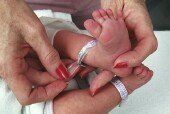Medical Errors Occur Frequently in Newborns
Events inadvertently caused by physicians or treatment that compromise safety occur frequently in neonates and are often serious, according to a report in the Feb. 2 issue of The Lancet.

FRIDAY, Feb. 1 (HealthDay News) -- Events inadvertently caused by physicians or treatment that compromise safety occur frequently in neonates and are often serious, according to a report in the Feb. 2 issue of The Lancet.
Isabelle Ligi, M.D., and colleagues from Universite de la Mediterranee in Marseille, France, examined the rate of iatrogenic events -- unintended harm or suffering -- among 388 neonates during 10,436 patient days.
The researchers recorded 267 events in 116 patients, of which 34 percent were preventable and 29 percent were severe, giving an incidence of 25.6 per 1,000 patient days. The most severe events were nosocomial infections and respiratory events. Cutaneous injuries and medication errors were generally minor. Factors significantly increasing the risk of events included low birth weight and gestational age, length of stay and a central venous line.
"Iatrogenic events occur frequently and are often serious in neonates, especially in infants of low birth weight. Improved knowledge of the incidence and characteristics of iatrogenic events, and continuous monitoring could help to improve quality of health care for this vulnerable population," Ligi and colleagues conclude.
AbstractFull Text (subscription or payment may be required)
Copyright © 2008 ScoutNews, LLC. All rights reserved.